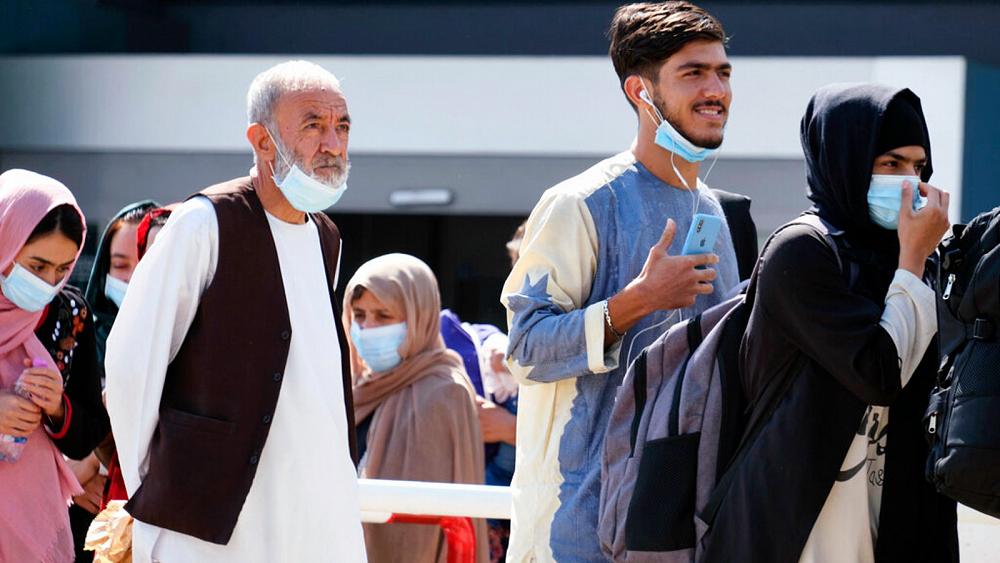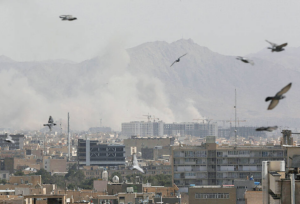
In a country like Italy, which has been a longstanding hotbed of political contestation and polarisation, it comes as no surprise that the latest global crisis — the fall of Afghanistan and the ensuing exodus of refugees — should serve to ignite a heated public debate.
Over the past decade, Italy has found itself at the forefront of Europe’s migrant crisis. Over the past weeks, it has evacuated more than 5,000 Afghans.
While other European governments have turned their backs, Italy’s prime minister, Mario Draghi — who currently leads a big tent coalition government — has openly welcomed refugees to Italy, criticising the EU’s overall approach.
Draghi’s position has been echoed by others, especially on the left. But for the right, and a large percentage of the wider Italian public, it represents a bone of contention.
The legacy of Italy’s last refugee influx
As a result of its position, Italy has been one of Europe’s main gateways for migrants and asylum seekers arriving via the Mediterranean Sea.
Many of those making the perilous journey enter the country through the small Sicilian islands of Lampedusa and Linosa, just off the coast of Tunisia.
While Italy has hosted refugees fleeing from war-torn territories and extreme poverty for decades, it received the biggest bulk of arrivals in the past 10 years. At the peak of the Mediterranean refugee crisis in 2016, 181,436 people reached Italy’s shores.
At the time, such an influx sparked a fierce political debate in a country that was still reeling from the shock of the Eurozone crisis.
While attitudes in Italy towards refugees have traditionally been warm, a noticeable shift occurred in the mid-2010s, as refugees came to be framed as a “danger” in mainstream media narratives. A survey also revealed Italians overestimated the percentage of foreigners living in the country.
The EU, in particular, came under fire, as a perceived lack of solidarity — especially as the Dublin Regulation “country of first arrival” policy had put a particular onus on Italy — prompted a surge in Eurosceptic sentiment.
The meteoric rise of Northern League (Lega Nord) leader Matteo Salvini has been linked by a variety of scholars and media outlets to the refugee crisis itself, with his transformation of the Lega from a moribund, scandal-ridden secessionist party into the nationalist, pan-Italian force. The party, standing on an anti-immigration platform, won the 2019 European Parliament elections in Italy.
As the Taliban’s takeover of Afghanistan has caused thousands to flee from their homes, this new refugee crisis has led to politicians coalescing along the same lines as in the mid-2010s – with the left supporting an “open doors” policy and the right expressing concern.
Polls would also suggest that the division inside Rome’s parliament is reflected within the wider Italian public. A survey conducted by Affaritaliani.it found that almost half of Italians (47.1%) were opposed to welcoming Afghan refugees into the country and Europe at large.
The far-right’s hesitancy
On the far-right end of the political spectrum, figures like the League’s Matteo Salvini and Giorgia Meloni from Brothers of Italy (Fratelli d’Italia) have shown hesitancy towards the prospect of thousands of Afghan refugees entering and settling in Italy, fearing a mass wave of migrants that could “burden” the country.
Speaking last month, Salvini stated that he supported the idea of “humanitarian corridors for women and children” but wanted there to be checks on those wishing to come to Italy.
“Open doors for thousands of men, including potential terrorists?” he quipped. “Absolutely not.”
Salvini’s coalition colleague, Giorgia Meloni has taken a more hardline stance by arguing that neighbouring countries should be the ones to welcome Afghan refugees, believing that humanitarian corridors are “not the solution”.
“As the German Chancellor [Angela] Merkel has already stated we believe that the first thing to do is to support the states right next to Afghanistan to help them welcome refugees,” Meloni said.
Even Berlusconi’s party — the more moderate, centre-right Forza Italia — was concerned by the possible security threat posed by welcoming refugees into the country.
“[This] humanitarian crisis risks turning into a mass immigration that would be very dangerous for our already-compromised social system,” stated Antonio Tajani, the Coordinator of Forza Italia and the former President of the European Parliament (2017-2019).
Umberto La Morgia, a former Northern League councillor in the Emilia-Romagna region, and now a member of the Brothers of Italy, told Euronews: “It’s understandable that people should be leaving [Afghanistan], and that, in this case, we’re dealing with actual refugees who need to be helped and welcomed.”
At the same time, however, he reiterated that it should be “neighbouring countries” and the US — as opposed to Italy — who ought to provide the greatest degree of assistance, while supporting a humanitarian corridor between Afghanistan and Italy for “women and children in particular”.
‘We are ready to welcome refugees’
Opposing the trepidation felt among many on the right, both the centre-left coalition (headed by the Democratic Party – Partito Democratico) and — albeit less forcefully — the populist Five Star Movement (Movimento 5 Stelle) have supported humanitarian corridors and urgently called for refugees to be accepted into Italy.
“Let’s mobilise the nation to help those who are staying [in Afghanistan] and welcome those who are fleeing,” tweeted Democratic Party leader and former Italian Prime Minister (2013-2014), Enrico Letta. “Let’s support Afghan society, its evolution, and the women and men who don’t want to go back to the Middle Ages. We are here.”
Various mayors across Italy, including Rome’s Virginia Raggi, from the Five Star Movement, have openly welcomed the arrival of refugees. Also, several politicians, figures and leaders have condemned the rhetoric of many on the far-right, deeming it divisive and against the spirit of international cooperation.
“Stirring up arguments about [welcoming refugees] doesn’t make sense,” asserted Laura Boldrini, a Democratic Party MP and former President of the Chamber of Deputies (2013-2018) and United Nations spokesperson. “All that’s needed is for the laws that already exist on requests for humanitarian protection to be respected – laws that, first and foremost, foresee an access to the [destination’s] territory.”
Moreover, Andrea Mammone, a professor at Royal Holloway, University of London, and one of the leading experts specialising in the history of the far-right, strongly criticised the way in which the Afghan refugee crisis had been “politicised” as part of a nationalist agenda.
“As with many other European far-right politicians, Salvini and Meloni initially criticised the West because of its military policy – which was abandoning Afghanistan in the hands of radical Islam,” he told Euronews. “But they immediately made it clear how Italy cannot take refugees. In doing so, they show their anti-immigrant politics, considering Islam to be against traditional European values.”
‘We are all very worried’: The plight of Afghan refugees in Italy
For the thousands of Afghan refugees currently residing in Italy, the crisis has caused deep concern. Many are worried about their relatives still in Afghanistan or struggling to leave.
Gulbadin Ahmedzai is one such person. Fleeing in 2016, he was hosted by family near Padua, in the Northern Italian region of Veneto, where he now speaks fluent Italian and runs a pizzeria.
“My family wanted to stay in Afghanistan, but now I want them to be safe, here with me,” he said, troubled by ongoing developments in his home country. “These days I keep reiterating my promise to them: I will bring you all here, to safety.”
Another refugee from the Panjshir region, who escaped to Italy last month, told Euronews last month that he would have been “killed” by the Taliban had he stayed, and that he fears for members of his family who have stayed behind.
“We are all very worried,” stated Qurban Ali Esmaely, the president of the Cultural Association of Afghans in Italy, while speaking to ANSA. “We don’t know how to help, everyone just thinks about how and to where they’ll escape. There’s an indescribable terror among people.”






